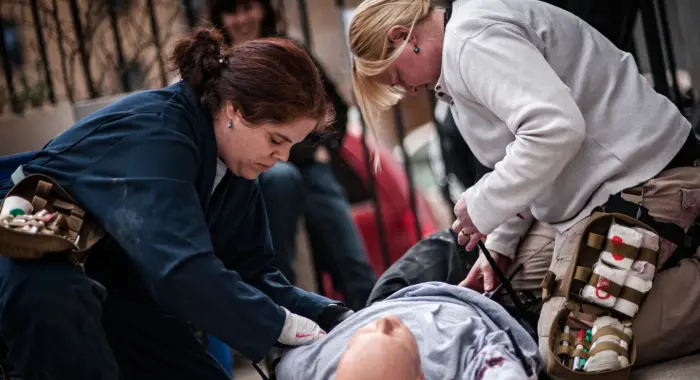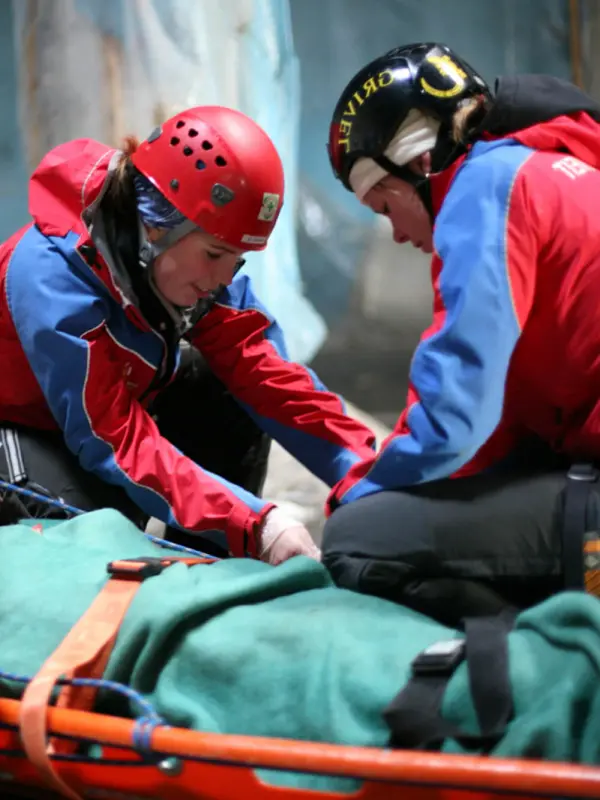Conflict & Remote First Aid
- Minimum Duration
- 24 Hours
- Minimum Age
- 16*
- Minimum Cost
- $450
- Skill Level
- Any

Description
This course is for learners who anticipate providing care in dynamic, austere, and hostile situations and environments. Specifically, CRFA will prepare those who provide first aid, humanitarian relief, and prolonged field care in conflict zones, natural disasters, and limited-resource environments.
Students will learn essential medical skills to manage traumatic injuries and medical emergencies when professional help is not immediately available. The curriculum covers hemorrhage control, basic airway management, wound care, fracture stabilization, and environmental emergencies, with a focus on practical, hands-on training. Participants will engage in realistic scenarios to develop critical decision-making skills under pressure.
Requirements
Prior to enrolling, please review our Functional Position Description. The criteria in this policy allow students to self-assess their ability to meet the demands of a WMA International course as well as the demands of a certified wilderness medical provider in the field.
*Guardians consenting for minor involvement must be made aware that this course will tangentially reference direct threat and indirect threat scenarios such as civil unrest and acts of terrorism.
Evaluation
This course is pass/fail. 100% attendance is mandatory. Evaluation is based on practical patient simulations, hands-on activities, and a written test. WMA International is committed to making reasonable accommodation for any student with special needs.
Course Topics
- Recognition of signs and symptoms associated with serious medical emergencies.
- Patient assessment and emergency care including adult CPR and AED use, basic life support skills, the patient assessment system, patient reporting, and calling for help.
- Emphasis on prioritization of care based on injuries and potential for intervention.
- Non-technical lifting, moving, and extrication of patients with an emphasis on spinal motion restriction when applicable
- Management of wounds such as lacerations, burns, and blisters.
- Treatment of musculoskeletal injuries, including splinting and pain management.
- Environmental medicine including illness and injuries related to temperature, lightning, submersion, and environmental toxins.
- Backcountry medicine, including the assessment and treatment of common medical problems.
- Practical Skills including bleeding control, wound cleaning, bandaging, splinting, spine stable patient packaging, hypothermia management, medical kit preparation.
- WMA International wilderness protocols, including treatment of anaphylaxis, wound management, and special considerations surrounding CPR.
Course Topics
- Recognition of signs and symptoms associated with serious medical emergencies.
- Patient assessment and emergency care including adult CPR and AED use, basic life support skills, the patient assessment system, patient reporting, and calling for help.
- Emphasis on prioritization of care based on injuries and potential for intervention.
- Non-technical lifting, moving, and extrication of patients with an emphasis on spinal motion restriction when applicable
- Management of wounds such as lacerations, burns, and blisters.
- Treatment of musculoskeletal injuries, including splinting and pain management.
- Environmental medicine including illness and injuries related to temperature, lightning, submersion, and environmental toxins.
- Backcountry medicine, including the assessment and treatment of common medical problems.
- Practical Skills including bleeding control, wound cleaning, bandaging, splinting, spine stable patient packaging, hypothermia management, medical kit preparation.
- WMA International wilderness protocols, including treatment of anaphylaxis, wound management, and special considerations surrounding CPR.
